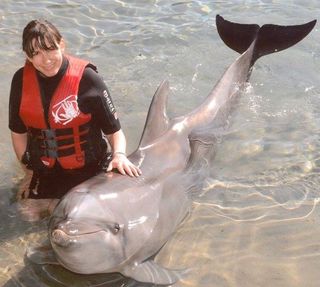Can captive animals be happy? In a recent Psychology Today article, Marc Bekoff cites Janis Joplin's famous quote "Freedom's just another word for nothin' left to lose" to argue for a non-interventionist approach to the lives of animals.
For many years I've been thinking about whether wild nonhuman animals (animals) are always happier than captive animals of their own species, and last week someone asked me this very question. After reading this brief foray into speculations about animal well-being, you'll see there aren't any easy answers.
In a small survey - most respondents asserted with confidence that the lives of animals in captivity are worse than that of animals in the wild. While I agree with the general notion that many animals (especially those in farming practices) have lives that are much worse than those of animals in the wild - perhaps even below a level that would be considered worth living (as in the case of poultry farming) - I don't think that we should be too quick to judge the lives of 'free' animals intrinsically better:
Here are some thoughts on what's involved when pondering whether wild animals are always happier than captive animals of the same species. The bottom line for me is that the each individual animal's well-being and freedoms must come first, and the most appropriate answer must focus on the nitty-gritty details of the situation at hand. Furthermore, because individuals of the same species can have different needs, it's difficult to offer species-wide answers. Ultimately, what we decide to do for them and to them must be beneficial for them, not solely for us. So, for example, keeping animals in cages or otherwise confined for human entertainment or for other human activities in which the nonhumans inevitably lose freedoms to make choices and to control their lives aren't options, unless what we choose to do benefits the specific individual.
I agree with almost everything in Marc's assessment except for his emphasis on freedom. If it is happiness or more generally pleasure (as in all kinds of positive affective states) than we would cover everything of relevance by considering as Marc points out the individual's wellbeing. Why then bring in freedom(s)? Here, he defers to the debate on what it means "to be happy":
What does "being happy" mean?
When trying to answer the question if wild animals are always happier than captive animals, a lot swings on how "happy" is defined. There are many synonyms for happy, but they all seem to boil down to an individual having the best life possible–feeling safe and living as free as possible from fear, various stressors, suffering, and pain. Rigorously assessing an individual's happiness is difficult, and I don't know of any study that has actually collected data on an individual(s) who is having a biologically appropriate natural life–assuming this to be a good and happy life for them–and then is brought into captivity.
But a 'natural life' is just as spuriously linked to welfare than is freedom. While there are many cases where 'unfree' animals suffer, and animals that live very different lives from their wild counterparts may do so as well in many cases, this is not a conceptual, i.e. necessary connection. It is an empirical question, that itself needs to be answered with the tools of animal welfare science.
As my fiancée - Heather Browning (2020) - in her excellent article on the Natural Behavior Debate argues: "The common theme here is that while many natural behaviours may be conducive to, or indicative of, good welfare, what is really important is their impact on the animal and the creation of accompanying positive mental states – without these, the behavior serves no real welfare function. Instead of performance of natural behavior as a criterion of welfare, we then need to attend to which aspects of such behavior may be important to welfare. This allows us to focus on the consideration that should be central in welfare decisions – what it is that matters to the animals themselves." (2020, p. 335)
Since this is a big topic, I would like to offer more details for interested readers. In my next article, I will offer a closer examination of Heather Browning's argument (and paper) to show how Marc's view can be improved upon.

Heather Browning: animal welfare specialist
Source: Source: HB
If you are interested in animal welfare more generally - you might be interested in checking out Heather Browning's work more generally:
https://www.heatherbrowning.net
"captivity" - Google News
July 23, 2020 at 01:19PM
https://ift.tt/32P2h9g
Can Captive Animals Be Happy? - Psychology Today
"captivity" - Google News
https://ift.tt/3b01anN
https://ift.tt/3dbExxU
Bagikan Berita Ini














0 Response to "Can Captive Animals Be Happy? - Psychology Today"
Post a Comment